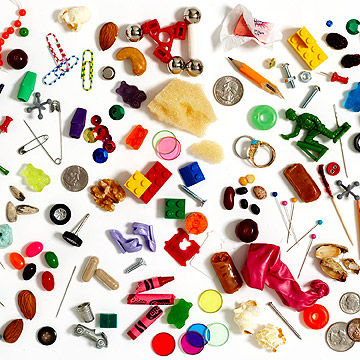Prevent Choking
Updated September 26th, 2018

Babies, toddlers and young children are at higher risk of choking. They like to put things in their mouths as they explore their world. They can choke if food or small things get stuck in their throat and block their breathing. Parents can help prevent choking by keeping small items away from the child and preparing food carefully. By learning first aid and CPR, parents can recognize when a child is in danger and respond quickly.
Common household choking hazards
- Coins
- Balloons
- Batteries
- Fridge magnets
- Beads and buttons
- Marbles
- Small rubber balls
- Bottle caps
- Lego and other small toys
- Plastic bags
- Jewellery, including amber teething necklaces/ bracelets
- Clothing tags
- Holiday decorations
Safety tips to prevent choking:
- Keep small items off the floor, and away from children.
- Choose toys that are safe for your child by following the age recommendation on the package. See Health Canada for more information on toy safety.
- Toys for older children are often small or have small parts. Keep these toys away from your infant or toddler.
Common foods that cause choking
- Nuts, seeds and beans
- Peanuts
- Popcorn
- Hot dogs and sausages
- Whole grapes
- Raw vegetables and fruit chunks
- Hard and sticky candies
- Gum and gummy candies
Safety tips to prevent choking:
- Always stay with your child when he is eating.
- Avoid giving hard or gummy candies, nuts or seeds to children under 4 years of age.
- Cut hot dogs and sausages lengthwise into small strips.
- Cut grapes and other fruit into small pieces.
- Grate or chop raw carrots and apples.
- Do not give your child gel candies.
Note: Other videos may be recommended by the host channel (e.g. YouTube, Vimeo). These suggestions may be based on your personal search history and other factors. The WRHA does not control these suggestions and is not responsible for and may not endorse the content.
If your child is choking this is an emergency. Call 911. They will send emergency help and tell you what to do until they get there.
References:
Preventing Choking and Suffocation in Children, Canadian Paediatric Society